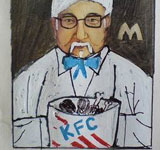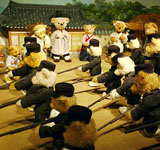| Dictionary campaign gives new meaning to compassion in rural China | |
http://english.dbw.cn銆€銆€
2010-11-26 13:55:11
|
|
|
To most Chinese children, a dictionary means another reference book to squeeze into an already weighty school bag. But a young Shanghai graduate has redefined it as a symbol of hope for the children of an impoverished rural village school. When Wu Heng volunteered to teach in Sanhe village in Xiji county in northwest China's Ningxia Hui Autonomous Region, he intended to stay a year and then move on. The Fudan University graduate came to the small, remote village in August 2009 to serve as a Chinese teacher at the junior high school. But during class one day in December, an 11-year-old boy asked Wu why a character he had written on the blackboard was different to the one in his dictionary. He wondered if her teacher had made a mistake. Looking at the boy's dictionary, Wu was surprised to find it was a pirated book, and the character was wrongly printed. He checked the dictionaries of the rest of the class. Of the 33 students who could afford dictionaries, only six had authorized editions, and most were falling apart. SPREADING THE WORD The next day, he and other teachers found the problem of pirated or dilapidated dictionaries was common among the 715 students. Sanhe village of Xiji county, lies in the Xihaigu area, one of China's most impoverished regions and one of the world's least habitable areas, according to the United Nations. |
|
| Author锛? 銆€銆€銆€Source锛? xinhua 銆€銆€銆€ Editor锛? Yang Fan | |
 涓枃绠€浣?/a>銆€|銆€
涓枃绠€浣?/a>銆€|銆€










